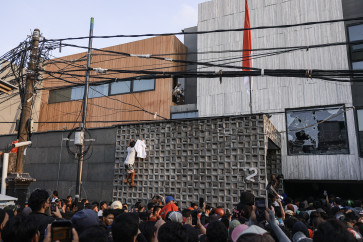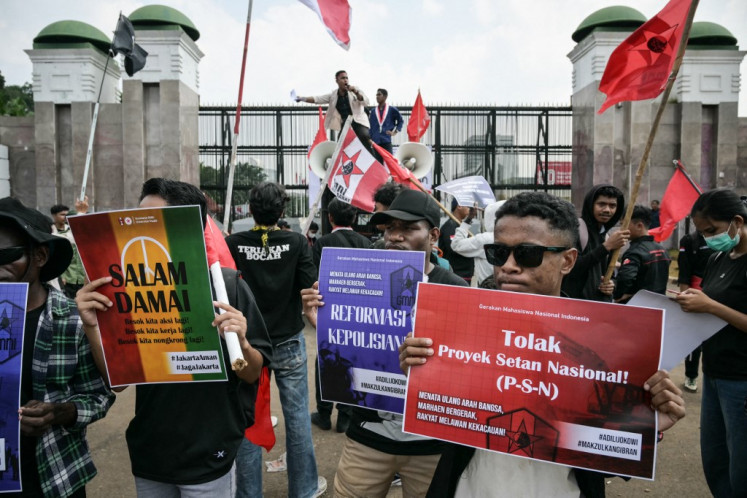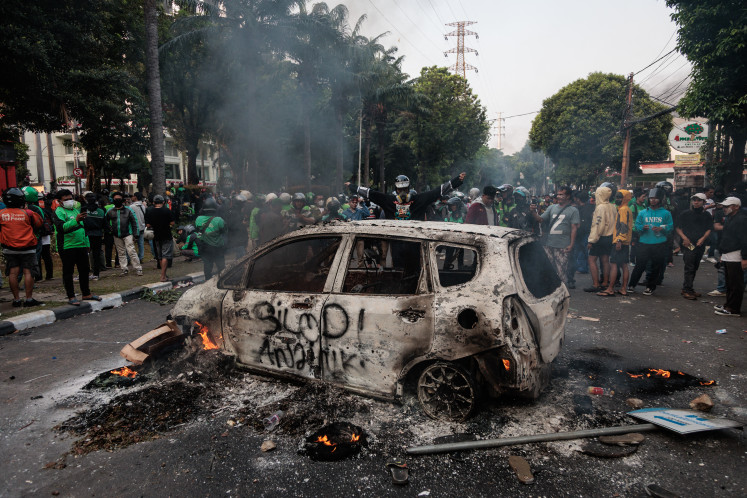Popular Reads
Top Results
Can't find what you're looking for?
View all search resultsPopular Reads
Top Results
Can't find what you're looking for?
View all search resultsNegative advertising in political campaigns
Negative advertising seems a common phenomenon in political campaigns here, thus banning this kind of advertising is considered necessary to many
Change text size
Gift Premium Articles
to Anyone
N
egative advertising seems a common phenomenon in political campaigns here, thus banning this kind of advertising is considered necessary to many.
On the other hand, this issue is still much debated, as this practice raises questions regarding ethics and the responsibilities that politicians and society need to take into account concerning particular negative effects of negative political campaigning. A variety of different arguments have been put forward about the issue.
It is claimed that negative advertising is an excellent strategy, which is often used in political campaigns in many other countries (Tanuwidjaja, 2009). This is true because negative advertising in political campaigns can persuade voters.
However, in reality this negative advertising is not really effective. This is clearly because voters can differentiate which one is the best candidate. They cannot be fully influenced by negative advertising.
Furthermore, negative advertising is only effective for low-income people, who are more gullible as they are mostly uneducated and tend to easily believe the claims mentioned in the negative campaigns.
Claiming that it is better to legalize negative advertising because voters need to know a candidate’s background, whether it is good or bad, seems to be true. Nowadays, many people do not care about politics.
And this problem could be solved by creating interest in politics such as by giving the background and achievements of the candidates. Indeed, negative advertising in political campaigns is one method that can be used to change people’s perception about politics. As a result, this measure can create intelligent community politics.
However, negative advertising in political campaigns often produces “the politics of the personal”, focusing on the personality or personal qualities of the candidate. In fact, the politics of the personal is not appropriate for developing countries, such as Indonesia which is a new democracy.
The politics of the personal may result in provocation that can easily end in violence in Indonesia. For instance, many ethnic conflicts occurring in Indonesia recently were triggered by provocation and racial issues raised in political campaigns.
Furthermore, the politics of the personal may damage the democratic process. The main reason for this is that the candidate and the sponsor may create a defamatory campaign to win the election. For example, during the 2009 presidential election, the wife of Boediono (then running mate of SBY) was accused of being a Christian although she is Muslim.
Martinez and Delegal (1990) claim that negative campaigns are an effective medium to create a fair and open competition in political elections. By attracting and criticizing each other through negative advertising, voters will get enough information before they decide to choose a candidate. This is because the balancing role of the mass media and civil society can monitor the fair running of the election.
In contrast, as Rainer Adam (2006) states, a negative campaign strategy often fails because voters give a negative reaction to the candidate who insults other candidates unfairly.
Indeed, there is a little difference between legitimate criticism and harsh insults. For example, during the 2009 presidential election, Andi Mallarangeng (one member of SBY’s election campaign team) said that this was not the right time for a Makassarese to become Indonesia’s top leader.
It is clear that Election Day will prove whether supporters of negative political campaigns are right and successful or not. The evidence suggests that negative political advertising should be banned.
Although negative campaigns may be based on truth, however the truth has often been abused to attack the opponent. Politicians and candidates use many strategies to win the election, although some of these may be illegal and unethical. Politicians and candidates perhaps apply the Machiavelli theory, i.e. we can use all means to get and defend political power.
Furthermore, negative political advertising in political campaigns can produce a dangerous bureaucratic and social backlash. The bureaucracy and the people may split into two groups — one in support of those in power and another that supports the challengers.
As a result, the bureaucracy cannot focus on their jobs as they are disrupted by the campaign activities. The insult campaign between presidential candidates SBY and JK during the 2009 presidential election is a good example of negative advertising in political campaigns.
In my opinion, negative advertising in political campaigns should be banned, or at the very least, it should be strongly regulated by governments.
Only in this way can the valuable political education that the Indonesian people need develop, while at the same time encourage the contributions of all productive members of our society to develop our country.
People’s perception about politics will change gradually if we succeed in reducing the use of negative advertising in day-to-day politics.
The writer is an activist with the Muhammadiyah Youth Association and a researcher at the Center for the Study of Religion and Civilization.










